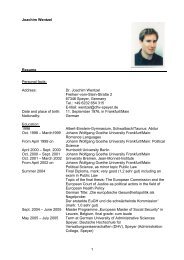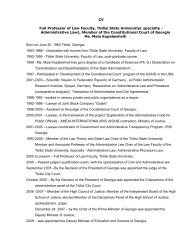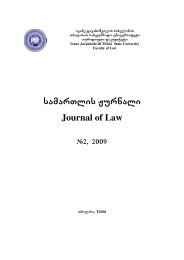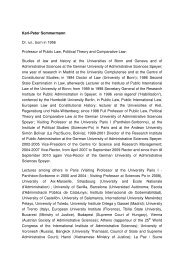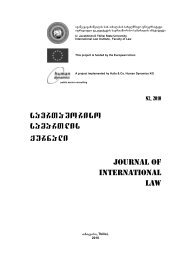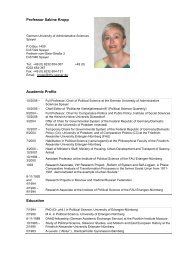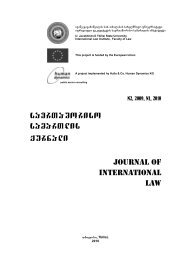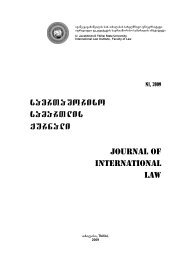Untitled
Untitled
Untitled
Create successful ePaper yourself
Turn your PDF publications into a flip-book with our unique Google optimized e-Paper software.
LALI PAPIASHVILI<br />
SOME ISSUES OF JUVENILE JUSTICE<br />
The number of children aged under 18<br />
held in detention in all over the world grew<br />
dramatically. Increases took place in both the<br />
remand and sentenced population. According<br />
to UNICEF researches, over 1 million children<br />
are deprived of their liberty by law enforcement<br />
officials. At the same time an increasing<br />
number of juveniles are being prosecuted often<br />
for non-violent offences.<br />
Children in detention often suffer violations<br />
of their basic rights – including no education<br />
and lack of basic medical care. Frequently,<br />
the conditions under which they live<br />
are deplorable and inhumane – no heat, inadequate<br />
food, insufficient beds, poor sanitation<br />
facilities and no exercise, cruel and inhuman<br />
disciplinary measures, insufficient<br />
sleeping space and living quarters, poor or<br />
non existent educational and vocational training<br />
opportunities, lack of information and little<br />
or no contact with the outside world and etc.<br />
Some are kept in solitary confinement for long<br />
periods. Physical abuse is common. In many<br />
cases, even the most fundamental principles<br />
of due process are violated. Parents are commonly<br />
denied right to visit and are often not<br />
informed of a child’s whereabouts.<br />
It is clear that institutionalization is an extremely<br />
painful process for young offenders.<br />
The fact that they have been arrested and<br />
placed in a prison or a juvenile institution stigmatizes<br />
them for life, a stigma that is memorialized<br />
in official identity documents and from<br />
which they cannot escape as they seek employment<br />
and a normal life in the community.<br />
Moreover it has repeatedly demonstrated the<br />
ineffectiveness of both punishment and incarceration.<br />
The history of criminal and juvenile justice<br />
and the high reconviction rates for young<br />
people leaving prison establishment demonstrate<br />
the failure of traditional approaches to<br />
crime control based on punishment.<br />
Instead of depriving children of liberty, the<br />
Convention on the Rights of the Child urges<br />
States to “seek to promote measures for dealing<br />
with such children without resorting to judicial<br />
proceedings” (Article 40). Entry into the<br />
formal justice system can be traumatic and can<br />
stigmatize an adolescent. It should therefore<br />
be avoided whenever the matter can be adequately<br />
dealt with in a less formal way. Diversion<br />
can take the form of a warning that future<br />
offences will have more serious consequences,<br />
voluntary acceptance of some form<br />
of supervision or counselling, a commitment<br />
to attend school or to avoid persons or places<br />
associated with the offence, community service,<br />
or restitution to or reconciliation with the<br />
victim. The alternative to formal adjudication<br />
must be compatible with the rights of the child,<br />
which precludes measures such as corporal<br />
punishment. Therefore, deprivation of personal<br />
liberty shall not be imposed unless the juvenile<br />
is adjudicated of a serious act involving<br />
violence against another person or of persistence<br />
in committing other serious offences<br />
and unless there is no other appropriate response;<br />
The well-being of juvenile should be<br />
the guiding factor in the consideration of her<br />
his case.<br />
Therefore there is a more fundamental<br />
need to ensure that the numbers of youngsters<br />
in custody are kept to an absolute minimum.<br />
And in order to achieve this goal attention<br />
should be paid to the prevention of juvenile<br />
delinquency which requires efforts on the<br />
part of the entire society to ensure the harmonious<br />
development of adolescents, with<br />
respect for and promotion of their personality<br />
from early childhood. Since there is a high<br />
correlation between neglect and exposure to<br />
violence during childhood and involvement in<br />
crime, society and government are responsible<br />
according to Riyadh Guidelines to assist<br />
the family in providing care and protection and<br />
165




